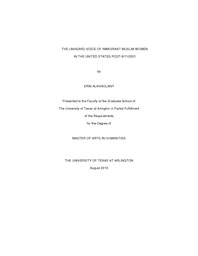| dc.description.abstract | Immigrant Muslim women in the United States experience difficulties, as most immigrants do, with integration into a new society. In order to better depict the reality that these women are actually experiencing a lack of voice to demonstrate their difficulties and subsequently receive assistance, I utilize intersectionality feminist theory to differentiate categories where analyses can lead to improved assimilation and ease in integration for these women. Specifically, the intersections of aspects such as religion, race, class, gender, and ethnicity are included as major points of concern in dissecting what it means to be an immigrant Muslim woman in the United States after 9/11 and how studying these intersections can lead to increased voice and improved conditions for those who are in need of it. Finally, I argue that the United States would benefit by using a system like the one Germany has utilized in integration assistance, which has seen positive results such as increased child care, English classes, and employment opportunities to women who otherwise may have been left in the shadows. | en_US |

